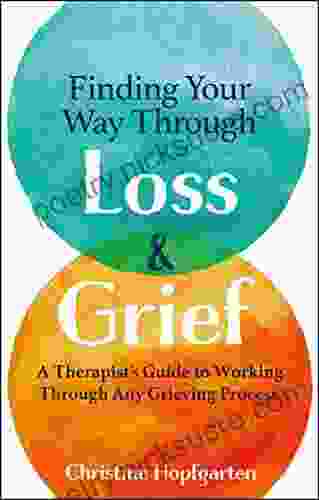The Ultimate Psychological and Emotional Guide to Thru-Hiking the Pacific Crest Trail

Embarking on a thru-hike of the Pacific Crest Trail (PCT) is an epic adventure that requires not only physical endurance but also significant psychological and emotional resilience. This 2,650-mile journey through the rugged wilderness of California, Oregon, and Washington tests the limits of the human spirit, pushing hikers to their emotional and mental boundaries.
To navigate this challenging trail successfully, it is essential to equip oneself with the psychological and emotional tools necessary to manage the unique challenges that arise. This comprehensive guide provides a detailed roadmap to help hikers prepare their minds and hearts for the transformative experience that lies ahead.
4.7 out of 5
| Language | : | English |
| File size | : | 1188 KB |
| Text-to-Speech | : | Enabled |
| Screen Reader | : | Supported |
| Enhanced typesetting | : | Enabled |
| Word Wise | : | Enabled |
| Print length | : | 206 pages |
| Lending | : | Enabled |
1. Cultivating Mental Fortitude
a. Embracing Grit and Resilience
Thru-hiking the PCT demands an unwavering determination to overcome adversity. Hikers will encounter numerous obstacles, from harsh weather conditions to physical exhaustion. Cultivating a mindset of grit and resilience is crucial to powering through these challenges and maintaining a positive outlook.
Remember that setbacks are inevitable, but they do not have to derail your progress. Learn to embrace challenges as opportunities for growth and development. Focus on the lessons you can learn from each experience, and use them to fuel your determination.
b. Developing Emotional Regulation Skills
The PCT trail provides ample opportunities for introspection and self-discovery. Hikers will inevitably experience a wide range of emotions, from euphoria to loneliness. Developing emotional regulation skills is essential for managing these emotions effectively and preventing them from overwhelming you.
Practice mindfulness techniques, such as meditation or journaling, to increase your awareness of your thoughts and feelings. Learn to identify your triggers and develop coping mechanisms to handle difficult emotions. Remember that it is okay to feel vulnerable at times, but it is important to find ways to process and release these emotions in a healthy manner.
c. Fostering a Growth Mindset
Adopting a growth mindset is essential for thriving on the PCT. This means believing that your abilities and potential are not fixed but rather malleable and capable of growth through effort and learning.
Embrace challenges as opportunities to expand your comfort zone and develop new skills. Instead of focusing on mistakes or setbacks, view them as stepping stones to improvement. By embracing a growth mindset, you will unlock your potential and maximize your growth throughout the journey.
2. Building Emotional Resilience
a. Connecting with Other Hikers
Forming strong connections with other hikers is a powerful source of support on the PCT. Share experiences, offer encouragement, and learn from each other's perspectives. Building a supportive community can significantly enhance your emotional resilience.
Join online forums or Facebook groups to connect with fellow hikers before and during your journey. Attend social events organized by trail associations and ranger stations. Embrace the spirit of camaraderie and seek solace in the company of others who share your passion for adventure.
b. Finding Purpose and Meaning
Discovering a sense of purpose and meaning can provide significant motivation and emotional support during challenging times. Reflect on your reasons for embarking on this journey and connect it to your values and aspirations.
Consider the personal growth you hope to achieve, the environmental stewardship you want to contribute to, or the connection to nature you seek to deepen. Having a clear sense of purpose will help you stay grounded and focused amidst the ups and downs of the trail.
c. Practicing Gratitude
Cultivating an attitude of gratitude can shift your perspective and enhance your emotional resilience. Take time each day to appreciate the beauty of your surroundings, the camaraderie of fellow hikers, and the transformative experiences you are encountering.
Keep a gratitude journal to document the moments that spark joy and fulfillment. Reflect on the lessons you are learning and the growth you are experiencing. By focusing on the positive aspects of your journey, you will build a reservoir of resilience to draw upon during difficult times.
3. Managing the Emotional Rollercoaster
Thru-hiking the PCT is an emotional rollercoaster, with highs and lows that can test your limits. It is essential to develop coping mechanisms for handling the inevitable challenges that arise.
a. Processing Negative Emotions
Allow yourself to experience and process negative emotions without judgment or suppression. Recognize that it is okay to feel discomfort, sadness, or frustration. Find healthy ways to express these emotions, such as journaling, talking to a trusted friend or therapist, or engaging in activities that bring you joy.
Avoid dwelling on negative emotions or allowing them to consume you. Practice self-compassion and remind yourself that it is normal to experience challenges. Focus on finding constructive ways to address and overcome these obstacles.
b. Coping with Loneliness and Isolation
Spending extended periods on the trail can lead to feelings of loneliness and isolation. Embrace these feelings as opportunities for reflection and personal growth.
Set aside time for solitude and introspection, but also make an effort to connect with other hikers and maintain regular communication with loved ones. Find creative ways to stay engaged, such as reading, writing, or pursuing hobbies. Remember that you are not alone in your journey, and there are people who care about you and support your adventure.
c. Overcoming Self-Doubt and Imposter Syndrome
Self-doubt and imposter syndrome can creep into your mind, especially during challenging times. Embrace these feelings as opportunities to challenge your limiting beliefs and build confidence.
Reflect on your strengths and accomplishments, both on and off the trail. Focus on the progress you have made and the resilience you have shown. Surround yourself with positive and supportive people who believe in you and your abilities. Remember that self-doubt is a common experience, and it does not define your worth or your potential.
4. Post-Trail Integration and Adjustment
Completing a thru-hike of the PCT is a transformative experience that can leave a lasting impact on your life. However, it is important to be aware of the challenges you may face as you reintegrate into your post-trail life.
a. Managing Reverse Culture Shock
Returning to society after spending months immersed in nature can be jarring. You may experience a sense of culture shock as you adjust to the fast-paced, technology-driven world you left behind.
Be patient with yourself as you readjust. Allow yourself time to reconnect with family and friends and gradually reintegrate into your previous routines. Seek support from fellow hikers or therapists who can understand your experiences and provide guidance.
b. Finding Meaning and Purpose in Post-Trail Life
The PCT experience can shift your perspective and redefine your priorities. You may find that your former passions no longer hold the same appeal. Explore new interests and activities that align with your post-trail values and aspirations.
Consider volunteering or getting involved in environmental stewardship to continue contributing to meaningful causes. Embrace the lessons you learned on the trail and apply them to your daily life, striving to live with purpose and authenticity.
c. Seeking Professional Help When Needed
If you struggle to adjust to post-trail life or experience significant emotional challenges, do not hesitate to seek professional help. Therapists who specialize in wilderness therapy or post-trail integration can provide support and guidance.
Remember that you are not alone in your experiences, and there are people who care about your well-being. By reaching out for help, you can navigate the challenges of post-trail adjustment and emerge stronger and more resilient.
Thru-hiking the Pacific Crest Trail is a profound and transformative experience that requires not only physical endurance but also significant psychological and emotional resilience. By cultivating mental fortitude, building emotional resilience, managing the emotional rollercoaster, and preparing for post-trail integration, you can equip yourself with the tools necessary to navigate the challenges and maximize the rewards of this life-changing journey.
Remember that the PCT is not just a trail; it is a metaphor for the journey of life. The obstacles you encounter, the emotions you experience, and the growth you achieve will shape you in ways you cannot imagine. Embrace the challenges, learn from your experiences, and emerge from the trail as a stronger, more resilient, and more compassionate individual.
4.7 out of 5
| Language | : | English |
| File size | : | 1188 KB |
| Text-to-Speech | : | Enabled |
| Screen Reader | : | Supported |
| Enhanced typesetting | : | Enabled |
| Word Wise | : | Enabled |
| Print length | : | 206 pages |
| Lending | : | Enabled |
Do you want to contribute by writing guest posts on this blog?
Please contact us and send us a resume of previous articles that you have written.
 Fiction
Fiction Non Fiction
Non Fiction Romance
Romance Mystery
Mystery Thriller
Thriller SciFi
SciFi Fantasy
Fantasy Horror
Horror Biography
Biography Selfhelp
Selfhelp Business
Business History
History Classics
Classics Poetry
Poetry Childrens
Childrens Young Adult
Young Adult Educational
Educational Cooking
Cooking Travel
Travel Lifestyle
Lifestyle Spirituality
Spirituality Health
Health Fitness
Fitness Technology
Technology Science
Science Arts
Arts Crafts
Crafts DIY
DIY Gardening
Gardening Petcare
Petcare James C Zimring
James C Zimring Genevieve Mckay
Genevieve Mckay Michael F Nenes
Michael F Nenes Pawel Malczewski
Pawel Malczewski Linda Lewis Alexander
Linda Lewis Alexander Sparknotes
Sparknotes Jonathan Franklin
Jonathan Franklin Kathy Morey
Kathy Morey Cathy Glass
Cathy Glass Marva Boatman
Marva Boatman Matthew Cobb
Matthew Cobb Shelley Emling
Shelley Emling Richard A Swanson
Richard A Swanson L A Cotton
L A Cotton Robert F Boszhardt
Robert F Boszhardt Dave Hughes
Dave Hughes Ken Robinson
Ken Robinson June Hur
June Hur Peyton Curley
Peyton Curley Becky Wade
Becky Wade Daniel Isberner
Daniel Isberner Jean Barbre
Jean Barbre Nisha Garg
Nisha Garg Good Books
Good Books Katharine Beals
Katharine Beals Jay Allan
Jay Allan Ruby Mcconnell
Ruby Mcconnell Lane Demas
Lane Demas Eric Greitens
Eric Greitens Paul Bloom
Paul Bloom Mike Reilly
Mike Reilly Jonathan R Brennan
Jonathan R Brennan Michael Burnett
Michael Burnett Bella Forrest
Bella Forrest Jackie Bolen
Jackie Bolen Miley Smiley
Miley Smiley Louise Katz
Louise Katz Susan M Schneider
Susan M Schneider Johnny Chuong
Johnny Chuong Sally Annjanece Stevens
Sally Annjanece Stevens Sandy Bodeau
Sandy Bodeau Roy R Grinker
Roy R Grinker Helen E Lees
Helen E Lees Nancy Marie White
Nancy Marie White Steve Oldenburg
Steve Oldenburg Charles Dickens
Charles Dickens Robert Gerver
Robert Gerver Gwen Mckee
Gwen Mckee Lily Dunn
Lily Dunn Horace Freeland Judson
Horace Freeland Judson Emily J Taylor
Emily J Taylor Jay Spence
Jay Spence Frances Schultz
Frances Schultz Stefan Hollos
Stefan Hollos Boye Lafayette De Mente
Boye Lafayette De Mente Matthew Locricchio
Matthew Locricchio Naomi Tomky
Naomi Tomky Anna Ivey
Anna Ivey H Jerome Chapman
H Jerome Chapman J E Esslemont
J E Esslemont Lori L Tharps
Lori L Tharps P M Gilbert
P M Gilbert G Norman Lippert
G Norman Lippert Damian Hall
Damian Hall Jacqueline Winslow
Jacqueline Winslow Joanna Wells
Joanna Wells Walter Mischel
Walter Mischel Tyler Richards
Tyler Richards Finn Aagaard
Finn Aagaard Sara Wickham
Sara Wickham Douglas Perry
Douglas Perry Jennifer L Lopez
Jennifer L Lopez Julie A Ross
Julie A Ross Dave Whitlock
Dave Whitlock Jackson Carter
Jackson Carter Elisabeth Haich
Elisabeth Haich R A Salvatore
R A Salvatore C W Farnsworth
C W Farnsworth Susan Spicer
Susan Spicer Paul Logothetis
Paul Logothetis Peter Watson
Peter Watson Timothy Ellis
Timothy Ellis Tim Cahill
Tim Cahill Mordecai Orimiladeye
Mordecai Orimiladeye James C Scott
James C Scott Josephine Mccarthy
Josephine Mccarthy L Chapman
L Chapman Curtis Collins
Curtis Collins Wendy Leo Smith
Wendy Leo Smith Jemar Tisby
Jemar Tisby Malcolm S Thaler
Malcolm S Thaler Pierluigi Barrotta
Pierluigi Barrotta James F Twyman
James F Twyman Wayne C Booth
Wayne C Booth Richard Appleton
Richard Appleton Kristina Cowan
Kristina Cowan Caryl Phillips
Caryl Phillips Anna Della Subin
Anna Della Subin Chris Fregly
Chris Fregly Krista Marson
Krista Marson Anna Quindlen
Anna Quindlen Dante Fortson
Dante Fortson Frank Thomas
Frank Thomas Stan Gibilisco
Stan Gibilisco College Hippo
College Hippo Philip Reed
Philip Reed Joshua Shifrin
Joshua Shifrin Stephen Tarsitano
Stephen Tarsitano Margaret Jean Langstaff
Margaret Jean Langstaff M Terese Verklan
M Terese Verklan Silvia M Lindtner
Silvia M Lindtner Mike Roberts
Mike Roberts Chase Hassen
Chase Hassen Aaron Mahnke
Aaron Mahnke Justine Gregory Williams
Justine Gregory Williams Tarani Chandola
Tarani Chandola Jenna Evans Welch
Jenna Evans Welch Suzanne Girard Eberle
Suzanne Girard Eberle Steven Yellin
Steven Yellin Lisa Randall
Lisa Randall Helge Kragh
Helge Kragh Dave Canterbury
Dave Canterbury Valerie Hansen
Valerie Hansen Holly Chism
Holly Chism Anna Bright
Anna Bright Sherry B Ortner
Sherry B Ortner Susan Straub
Susan Straub Helen Adrienne
Helen Adrienne Ralph Waldo Emerson
Ralph Waldo Emerson Joe Hyams
Joe Hyams Joy Dawson
Joy Dawson Jennifer Kostick
Jennifer Kostick Richard C Schwartz
Richard C Schwartz L J Smith
L J Smith Suzanne Clark
Suzanne Clark Hope Comerford
Hope Comerford Julian Of Norwich
Julian Of Norwich Dr Sarita Uhr
Dr Sarita Uhr Asker Jeukendrup
Asker Jeukendrup Ben Shneiderman
Ben Shneiderman Bob Madgic
Bob Madgic Harold Davis
Harold Davis Worley Faver
Worley Faver Annette Burns
Annette Burns John Pullen
John Pullen Jessa Stone
Jessa Stone Anna B Doe
Anna B Doe Jenny Jacobs
Jenny Jacobs Michael Hodgson
Michael Hodgson Barbara Sealock
Barbara Sealock Jennifer Dugan
Jennifer Dugan Omari Bouknight
Omari Bouknight Anna Lowenhaupt Tsing
Anna Lowenhaupt Tsing Christopher Seddon
Christopher Seddon Julian Havil
Julian Havil Caroline Miller
Caroline Miller Jack Perconte
Jack Perconte Stacey Williams
Stacey Williams Heidi Kreider
Heidi Kreider Steve Schwartz
Steve Schwartz Margaret Rogerson
Margaret Rogerson Sally Black
Sally Black Michael Witwer
Michael Witwer Peter L Falkingham
Peter L Falkingham Jay Young
Jay Young George Lakoff
George Lakoff Harley Mcallister
Harley Mcallister Christina Henry De Tessan
Christina Henry De Tessan Geryn Childress
Geryn Childress David Berry
David Berry Charles J Sanders
Charles J Sanders Robin Esrock
Robin Esrock Paul Mendelson
Paul Mendelson Martin N Seif
Martin N Seif Charlene Beswick
Charlene Beswick Vladimir Vasiliev
Vladimir Vasiliev Bob Cary
Bob Cary Mark Mckinney
Mark Mckinney Illustrated Edition Kindle Edition
Illustrated Edition Kindle Edition Howard Means
Howard Means Neel Doshi
Neel Doshi Ian Moulding
Ian Moulding Darryl Belfry
Darryl Belfry Louis Van Dyke
Louis Van Dyke Kristen L Mauk
Kristen L Mauk Roger Hall
Roger Hall Paulo Guillobel
Paulo Guillobel Kyung Won Chung
Kyung Won Chung Randall Fitzgerald
Randall Fitzgerald Philip Gibson
Philip Gibson Julie Creffield
Julie Creffield Peter Wacht
Peter Wacht Janine Marsh
Janine Marsh Annaka Harris
Annaka Harris Ariel Dalfen
Ariel Dalfen Lily Siou
Lily Siou Joyce Meyer
Joyce Meyer Cade Courtley
Cade Courtley Les Livingstone
Les Livingstone Roy M Wallack
Roy M Wallack Luke Schumacher
Luke Schumacher Tara Haelle
Tara Haelle Gill James
Gill James Zach Davis
Zach Davis Pradeepa Narayanaswamy
Pradeepa Narayanaswamy Maggie Downs
Maggie Downs Daphne Poltz
Daphne Poltz Antonio Robert
Antonio Robert Dean Buonomano
Dean Buonomano Barry Schwartz
Barry Schwartz Sarah Stodola
Sarah Stodola Graham Robb
Graham Robb Kendall Coyne
Kendall Coyne Morton Manus
Morton Manus Steven Munatones
Steven Munatones Shawn Shallow
Shawn Shallow Hannah Testa
Hannah Testa Shannon Vallor
Shannon Vallor Noel D Justice
Noel D Justice Buddy Lee
Buddy Lee Dan Koboldt
Dan Koboldt Todd Radom
Todd Radom Arcturus Publishing
Arcturus Publishing Livia Bitton Jackson
Livia Bitton Jackson Horace Kephart
Horace Kephart R K Agarwal
R K Agarwal Fumio Sasaki
Fumio Sasaki Peter Hathaway Capstick
Peter Hathaway Capstick M Shawn Copeland
M Shawn Copeland Tony Osgood
Tony Osgood Hill Harper
Hill Harper Sajni Patel
Sajni Patel Holly Bourne
Holly Bourne Steve Olson
Steve Olson Bethany Saltman
Bethany Saltman Winton Porter
Winton Porter Dr Harper
Dr Harper Neal Shusterman
Neal Shusterman J Scott Long
J Scott Long Bernard Stiegler
Bernard Stiegler Martin Meredith
Martin Meredith Michael Labossiere
Michael Labossiere Bob Labbe
Bob Labbe Anna Grafl
Anna Grafl Brian Daccord
Brian Daccord Margaret Paul
Margaret Paul Oskar Morgenstern
Oskar Morgenstern Steve Bowkett
Steve Bowkett Christine Hopfgarten
Christine Hopfgarten Chris Bailey
Chris Bailey Ann Marie Brown
Ann Marie Brown Breeda Bermingham
Breeda Bermingham Zena Hitz
Zena Hitz Sharon Rowley
Sharon Rowley Adil E Shamoo
Adil E Shamoo Darcie Little Badger
Darcie Little Badger Stephen J Pyne
Stephen J Pyne Suzanne I Barchers
Suzanne I Barchers Matthew Rudy
Matthew Rudy John O Sullivan
John O Sullivan Rebecca Carroll
Rebecca Carroll Thomas A Garrity
Thomas A Garrity Rick Page
Rick Page Robert A Cook
Robert A Cook Prime Hall
Prime Hall Scott Shupe
Scott Shupe Freddy Silva
Freddy Silva Maya Van Wagenen
Maya Van Wagenen Mary E Pearson
Mary E Pearson William P Young
William P Young Anna Watson
Anna Watson John Van Wyhe
John Van Wyhe Crystal Cook
Crystal Cook Steve Bennett
Steve Bennett Alexander L Chapman
Alexander L Chapman Susan G Solomon
Susan G Solomon Ann Mccallum Staats
Ann Mccallum Staats Chris Gore
Chris Gore Sandy Camillo
Sandy Camillo Emmett W Hines
Emmett W Hines Ling Seto
Ling Seto Scott P Sells
Scott P Sells The Pinnacle Review
The Pinnacle Review Annalyn Ng
Annalyn Ng Christine Field
Christine Field David Soucie
David Soucie Richard Mcafee
Richard Mcafee E R Truitt
E R Truitt Patricia Romanowski Bashe
Patricia Romanowski Bashe Mishka Shubaly
Mishka Shubaly Anna Flores Locke
Anna Flores Locke Kennedy Achille
Kennedy Achille Geoff Greig
Geoff Greig Barb Musick
Barb Musick Gary Chapman
Gary Chapman Kass Morgan
Kass Morgan C J Brown
C J Brown Earl Hipp
Earl Hipp Marie Cirano
Marie Cirano Ford R Bryan
Ford R Bryan Ichigo Takano
Ichigo Takano Scott Allan
Scott Allan Christopher T Coughlin
Christopher T Coughlin James P Sethna
James P Sethna Tanmay Mehta
Tanmay Mehta Laurie Varga
Laurie Varga Patrick Torsell
Patrick Torsell Stacey A Shannon
Stacey A Shannon Craig Ramsay
Craig Ramsay Zach Hunter
Zach Hunter Lisa Manterfield
Lisa Manterfield Reinhard Kleist
Reinhard Kleist Gemma Bray
Gemma Bray Elizabeth Wissner Gross
Elizabeth Wissner Gross Stephanie Cave
Stephanie Cave Rick Sparkman
Rick Sparkman Peter Richmond
Peter Richmond Lizzie Collingham
Lizzie Collingham Ann Valett
Ann Valett Stuart Tomlinson
Stuart Tomlinson Ellen Painter Dollar
Ellen Painter Dollar Seth Stephens Davidowitz
Seth Stephens Davidowitz Dannah Gresh
Dannah Gresh Lexi Ryan
Lexi Ryan Skeleton Steve
Skeleton Steve Tali Sharot
Tali Sharot Sean Covey
Sean Covey Sukhveer Singh
Sukhveer Singh Gilbert J Grant Md
Gilbert J Grant Md Trevor Hartman
Trevor Hartman Junior Health Institute
Junior Health Institute Dorothy Ours
Dorothy Ours Jason
Jason Danny Jones
Danny Jones Jill Lepore
Jill Lepore Kalman Samuels
Kalman Samuels Stefanie Japel
Stefanie Japel Todd Denault
Todd Denault Melvin Fitting
Melvin Fitting Chronicle Books
Chronicle Books Illysa R Foster
Illysa R Foster William Goldman
William Goldman Bruce Lockwood
Bruce Lockwood John Edwards
John Edwards Bren Smith
Bren Smith John Dickson
John Dickson Sally Connolly
Sally Connolly Nicholas Thomas
Nicholas Thomas Donna D Ignatavicius
Donna D Ignatavicius Christelle Dabos
Christelle Dabos James Burke
James Burke Randy J Paterson
Randy J Paterson Tim Young
Tim Young Mikael Lindnord
Mikael Lindnord Sheela Raja
Sheela Raja Henry Dillon
Henry Dillon Ann Voskamp
Ann Voskamp Patricia Ladis
Patricia Ladis Zoe Moore
Zoe Moore Melissa Mortenson
Melissa Mortenson Chic Scott
Chic Scott Glen E Clarke
Glen E Clarke Gloria Chadwick
Gloria Chadwick Harnarayan Singh
Harnarayan Singh John Baichtal
John Baichtal Rebecca A Moyes
Rebecca A Moyes Ann Zaprazny
Ann Zaprazny Sean Bartram
Sean Bartram Victor Stringer
Victor Stringer Marjorie Savage
Marjorie Savage Katie Krimer Ma Lcsw
Katie Krimer Ma Lcsw John Dunn
John Dunn Ralph Cockburn
Ralph Cockburn Sharman Apt Russell
Sharman Apt Russell Sara Dyer
Sara Dyer H M Schey
H M Schey Kristian Berg
Kristian Berg Dave Hall
Dave Hall David Woods
David Woods Nicholas Clapp
Nicholas Clapp Melanie Dickerson
Melanie Dickerson Larry Semento
Larry Semento W W Sawyer
W W Sawyer Zach Codings
Zach Codings Barry Dainton
Barry Dainton Adele Faber
Adele Faber Fox Fisher
Fox Fisher Julie Plagens
Julie Plagens Lina Beard
Lina Beard Sam Demas
Sam Demas Linda K Miller
Linda K Miller Julia Galef
Julia Galef Isaac Fitzsimons
Isaac Fitzsimons Steve Newell
Steve Newell Cb Droege
Cb Droege Jenn Bennett
Jenn Bennett Jonathan Pd Buckley
Jonathan Pd Buckley Ray Eye
Ray Eye John Murray
John Murray Annabel Streets
Annabel Streets Claire Walter
Claire Walter Karen Bassie Sweet
Karen Bassie Sweet Rutger Bregman
Rutger Bregman Michael Tan
Michael Tan Ray Moynihan
Ray Moynihan Jeff Kuehl
Jeff Kuehl Steve Grant
Steve Grant Clive Scarff
Clive Scarff Steven G Krantz
Steven G Krantz Vittal S Anantatmula
Vittal S Anantatmula Anna Crowley Redding
Anna Crowley Redding Ellen Dugan
Ellen Dugan Monroe Wildrose
Monroe Wildrose John Yates
John Yates Michael G Manning
Michael G Manning George James Grinnell
George James Grinnell Sean Purchase
Sean Purchase Mark Matlock
Mark Matlock Nelson Dellis
Nelson Dellis Guy Windsor
Guy Windsor Julie C Meloni
Julie C Meloni Quinn Loftis
Quinn Loftis Bert Mendelson
Bert Mendelson Carl Mckeating
Carl Mckeating Kate Mcvaugh
Kate Mcvaugh Eddie Jones
Eddie Jones Steven Callahan
Steven Callahan Robert A Conover
Robert A Conover Dan Gardner
Dan Gardner L J Martin
L J Martin Barak A Bassman
Barak A Bassman Dan Vogel
Dan Vogel Angela Saini
Angela Saini Hanumant Deshmukh
Hanumant Deshmukh Anne Sylvie Malbrancke
Anne Sylvie Malbrancke Creative Guy
Creative Guy Joey Myers
Joey Myers Richard A Ruth
Richard A Ruth Larry Thornberry
Larry Thornberry Steven A Fino
Steven A Fino Robby Weber
Robby Weber Timothy P Schultz
Timothy P Schultz Eleanor J Sullivan
Eleanor J Sullivan Alex Bromley
Alex Bromley Jacob Ward
Jacob Ward John Gignilliat
John Gignilliat Will Kurt
Will Kurt Judy Corry
Judy Corry Dana James
Dana James Anna Wood
Anna Wood
Light bulbAdvertise smarter! Our strategic ad space ensures maximum exposure. Reserve your spot today!

 Robert Louis StevensonMaking Informed Decisions in Pregnancy and Childbirth: A Comprehensive Guide
Robert Louis StevensonMaking Informed Decisions in Pregnancy and Childbirth: A Comprehensive Guide
 Fernando PessoaEmbark on a Nostalgic Journey: Turn of the Century Classic of Crafts and...
Fernando PessoaEmbark on a Nostalgic Journey: Turn of the Century Classic of Crafts and...
 Victor TurnerUnlock the Wonder of Riddles and Brain Busters for Kids: A Journey into Logic...
Victor TurnerUnlock the Wonder of Riddles and Brain Busters for Kids: A Journey into Logic... Devin CoxFollow ·15k
Devin CoxFollow ·15k George OrwellFollow ·16.7k
George OrwellFollow ·16.7k Holden BellFollow ·15.3k
Holden BellFollow ·15.3k Edward ReedFollow ·10.5k
Edward ReedFollow ·10.5k Dwight BellFollow ·7k
Dwight BellFollow ·7k Samuel WardFollow ·3.4k
Samuel WardFollow ·3.4k Michael CrichtonFollow ·6.8k
Michael CrichtonFollow ·6.8k Jerry HayesFollow ·2.9k
Jerry HayesFollow ·2.9k

 Aldous Huxley
Aldous HuxleyMorgenstern: A Classic Tale of True Love and High...
Morgenstern is a...

 Beau Carter
Beau CarterThe Oasis Guide to Asperger Syndrome
What is Asperger Syndrome? Asperger...

 Chadwick Powell
Chadwick PowellFinding Your Way Through Loss Grief: A Therapist S Guide...
Grief is a natural human emotion that we...
4.7 out of 5
| Language | : | English |
| File size | : | 1188 KB |
| Text-to-Speech | : | Enabled |
| Screen Reader | : | Supported |
| Enhanced typesetting | : | Enabled |
| Word Wise | : | Enabled |
| Print length | : | 206 pages |
| Lending | : | Enabled |












